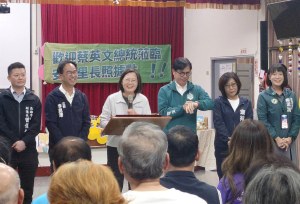Political tensions in the Taiwan Strait have risen recently as about 20 million Taiwanese voters prepare to elect their president and lawmakers on Saturday.
China’s Taiwan Affairs Office’s spokesperson Chen Binhua said Taiwanese people should not vote for Democratic Progressive Party (DPP)’s presidential candidate Lai Ching-te, because Lai’s “Taiwan independence” approach is dangerous and will only push the island towards war and recession.
“Cross-strait relations have deteriorated from peaceful development to tense confrontation over the past eight years,” Chen said in a media briefing on Wednesday. “The so-called ‘Tsai Ing-wen path’ is a path of ‘Taiwan independence’ and confrontation, and is harmful to Taiwan.”
He said “Taiwan independence” is the major threat to Taiwan’s security, the interests of Taiwanese people and regional stability.
Chen’s strong words came after Lai said at a press conference on Tuesday that he would continue Taiwanese President Tsai Ing-wen’s diplomatic, national defense and cross-strait policies. Lai also said he would help create a new situation in the Indo-Pacific region and push forward cross-strait exchanges and cooperation.
Lai said Taiwan’s door is always open for cross-strt cooperation based on the principle of reciprocity and dignity.
Lai’s advantage
Western media have described the coming Taiwanese elections as one of the most important political events in 2024 as the results could affect the stability of the Taiwan Strait, Sino-United States relations and the global chip supply chain.
According to the numbers released by media and research institutions on January 2, DPP’s Lai was leading in the final pre-election polls by 3-5 percentage points over the Kuomintang’s candidate, New Taipei Mayor Hou Yu-ih.
For example, a survey conducted by the United Daily News showed that Lai had a rating of 32% while Hou had 27%. The Taiwan People’s Party (TPP) candidate Ko Wen-je’s rating was about 21%.
However, Lai’s advantage seemed to be shrinking as Ko’s popularity among younger voters was rising due to his strong social media campaigns, Taiwanese commentators said.

They said some young DPP supporters may turn to vote for Ko as they were fed up with the cross-Strait political disputes and wanted their leaders to focus on improving people’s livelihood. If this is the case, KMT may still win the elections assuming Hou can gain trust from older voters.
On Tuesday, an open letter purporting to be from former independent candidate Terry Gou and endorsing Hou began circulating on the Internet. The letter has Guo calling on his supporters to vote for the KMT in order to stop the DPP from renewing its term.
Guo’s office said the billionaire did not write the letter. United Microelectronics Corp (UMC) honorary deputy chairman John Hsuan told the media that some friends had written the letter representing Gou’s views. Hsuan said Gou might not have read this letter but probably would not deny its content.
‘Trust Xi Jinping’
Meanwhile, former Taiwanese President Ma Ying-jeou also wanted to help Hou win but his recent comments have drawn controversy.
In an interview with Germany’s DW published on Wednesday, Ma says Lai is a long-term “Taiwan independence” promoter. He says Lai’s approach will only lead to a war in the Taiwan Strait while the US will avoid joining it as such a move would trigger a nuclear war.
Ma says the best approach is to communicate and cooperate with China as Taiwan can never win a war against China. He says that, in cross-strait relations, Taiwan must trust Chinese President Xi Jinping, who he insists has no plan to invade the island. He also says Taiwan should avoid boosting its defense expenses as that would provoke China.
Hou said Thursday that he has different views from Ma. He said he would not have unrealistic hopes about cross-strait relations. He said he will push forward his 3D strategy, which refers to deterrence, dialogue and de-escalation, meaning that he will not cut defense expenses but will continue to maintain dialogue with Beijing.
UMC founder Robert Tsao Hsing-cheng said Ma represents a small group of hypocritical Taiwanese business people, who support Beijing’s suppression of Taiwan. Tsao warned that if the KMT controls the government, it will gradually make Taiwan a replica of Hong Kong, which is now fully controlled by Beijing.
Tsao also suspected that Ko’s “unlimited resources” in online campaigns might come from Beijing. But he did not provide any evidence.
Balloons and satellite
Tensions in the Taiwan Strait had been growing over the past month as dozens of high-altitude balloons, launched by China, had been seen flying over and around Taiwan.
On January 7, three Chinese balloons flew over the median line in the Taiwan Strait; one of them crossed Taiwan at its southernmost tip.
Taiwan’s Ministry of Defense said the launch of mysterious balloons flying across the Taiwan Strait represents China’s “gray zone” harassment against the island.
On Tuesday, the ministry sent a bilingual emergency alert to residents’ mobile phones, telling them that a satellite had flown over Taiwan. However, it mistranslated “rocket” into “missile” in the English version of the alert, which shocked many Taiwanese people.
The ministry on Wednesday apologized for the mistranslation but insisted that the issuance of the alert had been necessary. President Tsai urged the public not to worry, ruling out the possibility that the launch of China’s satellite had been a political move.

Ling Tao, a spokesperson for the Kuomintang’s election campaign, on Wednesday said the Defense Ministry was being used by the ruling DPP as a tool to manipulate the coming elections.
He said the ministry had not issued any alert even though the People’s Liberation Army held large-scale military drills near Taiwan when then-US House Speaker Nancy Pelosi visited the island in August 2022. He questioned whether the DPP was using the Chinese Communist Party to intimidate Taiwanese people.
Read: Ruling DPP can still lose Taiwan’s presidency
Follow Jeff Pao on Twitter at @jeffpao3

